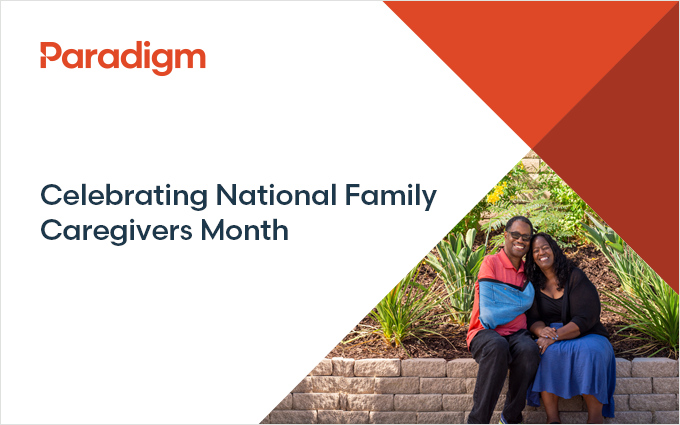11/16/2021

For so many patients, family members are the frontline day-to-day caregivers. These indispensable members of any treatment team do so much to help their loved ones return to their communities and jobs, often without getting the recognition they deserve.
Held each November, National Family Caregivers Month was created by the Caregiver Action Network to recognize and honor family caregivers across the country. This observance is a powerful way to raise awareness of caregiving issues, educate communities, and increase support for caregivers.
At Paradigm, our whole-person, whole-family approach to caring for injured workers is specifically designed to integrate family caregivers into the recovery process and provide the critical support they need. Because of this, we enthusiastically support National Family Caregivers Month and are pleased to promote its mission.
We spoke with Deborah Benson, PhD, Vice President of Clinical Solutions for Paradigm, about the tremendous impact family members have on helping their loved ones recover from workplace injuries and get back to their lives. She shared with us how the Paradigm care model supports family caregivers during this challenging time—just as much as it does injured workers.
Injuries change the family dynamic in fundamental ways
According to Dr. Benson, families play a vital role in recovery after workplace injuries: “There’s a strong relationship between the level of family support and a person’s ability to recover from a workplace injury, across a wide range of severity,” she explained.
Often, the needs of these family caregivers go unmet, even when they are dealing with significant hurdles themselves. “When someone experiences a catastrophic injury, virtually all of the attention and focus goes to the injured person,” said Dr. Benson. “And yet we know that family members and significant others experience tremendous amounts of stress and strain when caring for someone with a serious injury,” she continued. “This can include emotional and psychological signs of distress, including depression and anxiety, as well as physical strain; and even an increased risk of physical injury to themselves.”
This risk of emotional distress can apply to all types of family members and family arrangements. Emotional distress can manifest itself in unique ways, depending on the relationship. “There are many cases where an injured worker is being cared for by parents who are aging themselves, making it more difficult physically for them to provide assistance.” Dr. Benson also explained that when spouses and partners provide care, it can alter the fundamental dynamic of the relationship: “Spouses may experience what feels like a loss of the partner they had previously because of diminished physical abilities, changes in behavior, loss of cognitive abilities, or a combination of these.”
As family caregivers adjust to these potentially dramatic changes in their lives, it takes comprehensive support to ensure they are able to care for themselves, as well as assist their loved ones in achieving their highest potential.
Whole-person, whole-family care at work
Dr. Benson explained that the team at Paradigm comes together from day one to ensure family caregivers get the help they need: “We perform a thorough assessment of not just the patient, but of the family, and then we systematically implement support to address any challenges that we identify.”
She described step one as building an understanding of each patient’s family configuration and dynamics: “We need to find out who the key family members or significant others are that will be in the caregiver role,” she elaborated. “Our network managers and case managers are the frontline support in this regard, actively listening, guiding, and educating families directly. A big part of that is taking the time to understand each family’s unique situation and fostering a sense of trust and advocacy from the start.”
The Paradigm team has additional resources to ensure that injured workers and their family members are getting help to deal with their emotional and psychosocial adjustment challenges. “We have community support specialists that complement our frontline support, who can reach out directly to family members telephonically,” Dr. Benson explained. “These behavioral health professionals are there to listen, provide support, address concerns and provide coping skills. They can help identify and offer resources that may alleviate many of the stressors that are so often present for family caregivers.”
Paradigm is also committed to working with providers who share our commitment to ensuring whole-person, whole-family care throughout the process. For example, during lengthy inpatient rehabilitation stays, family caregivers often need help finding access to nearby housing. “Paradigm helps family members access providers that offer free or low-cost family housing, such as our value-based partner, Brooks Rehabilitation Hospital,” said Dr. Benson. “Our team is dedicated to researching and connecting family members with local housing options, so they can participate and provide support while their loved one is in active rehabilitation.”
From building behavioral support networks to housing, to simply being there for family caregivers, the team at Paradigm recognizes the key role that these heroes play along the injured worker’s road to recovery. We are here to salute, celebrate, and support family caregivers across the country!
Learn more about our whole-person, whole-family approach to Behavioral Health Support.